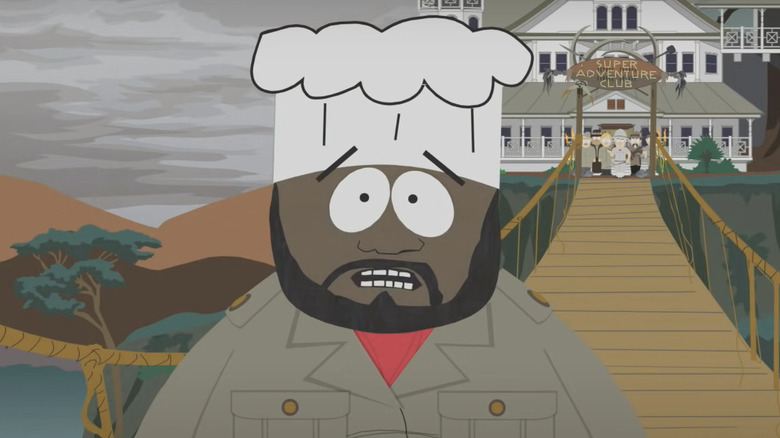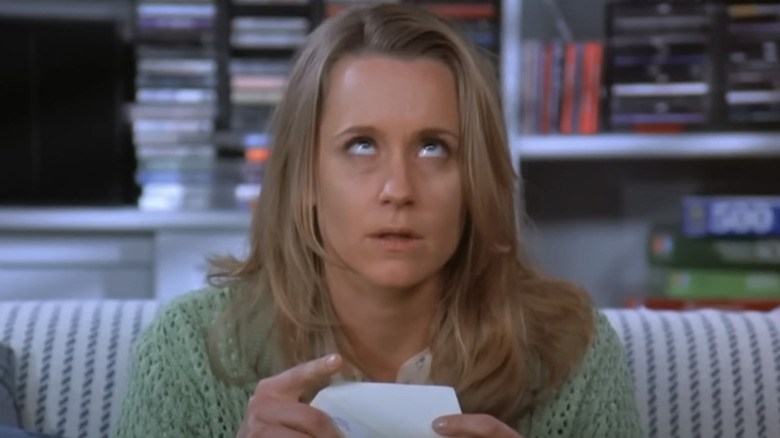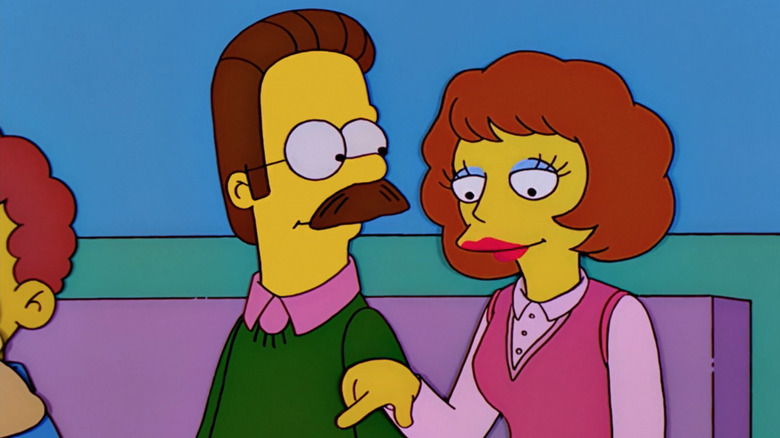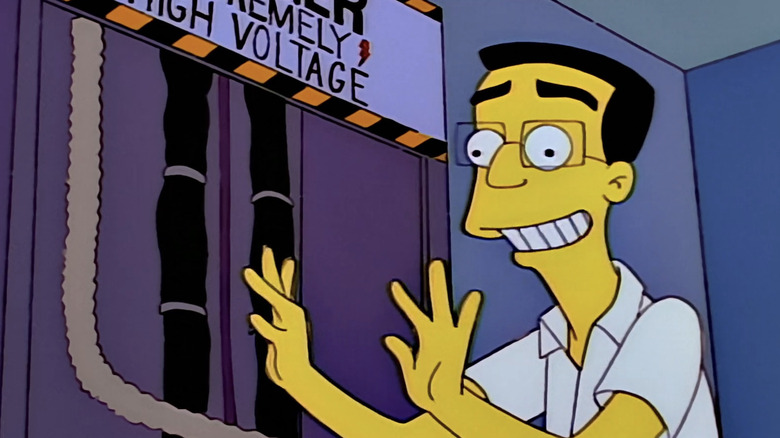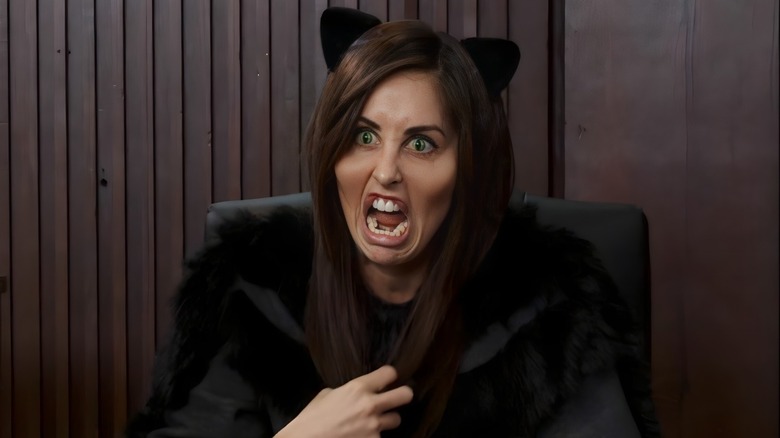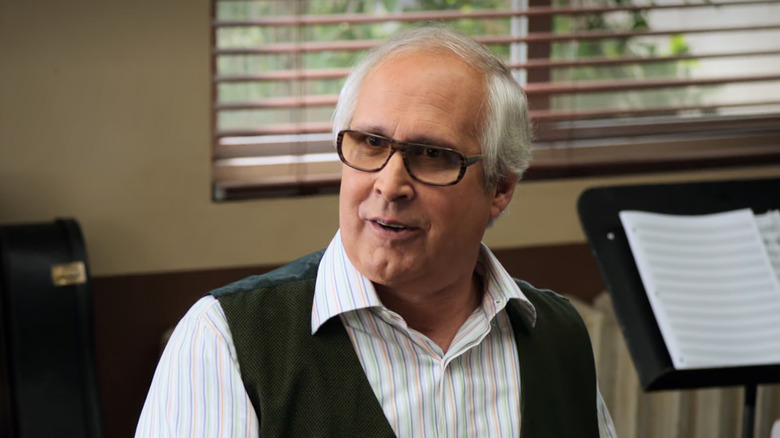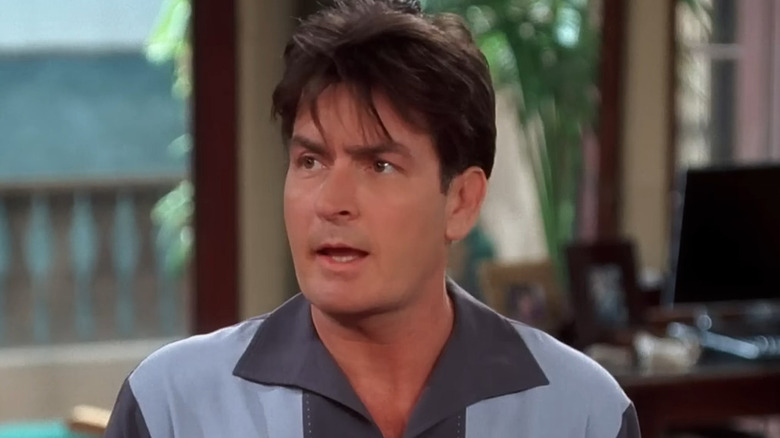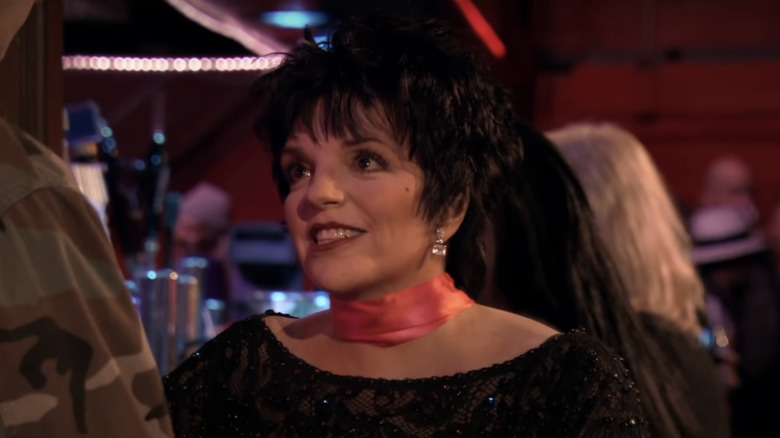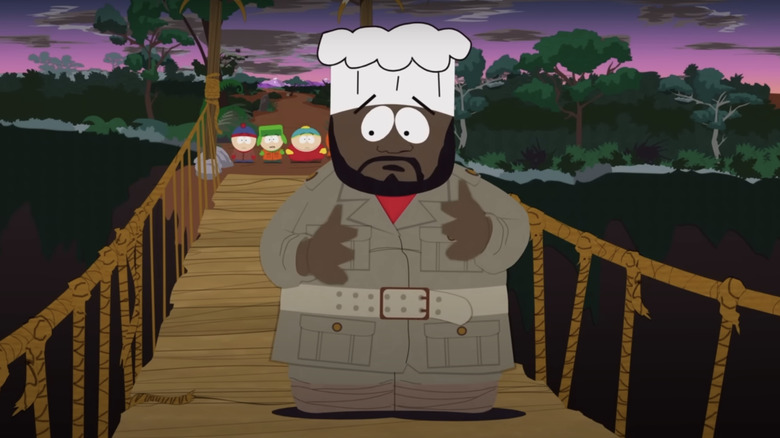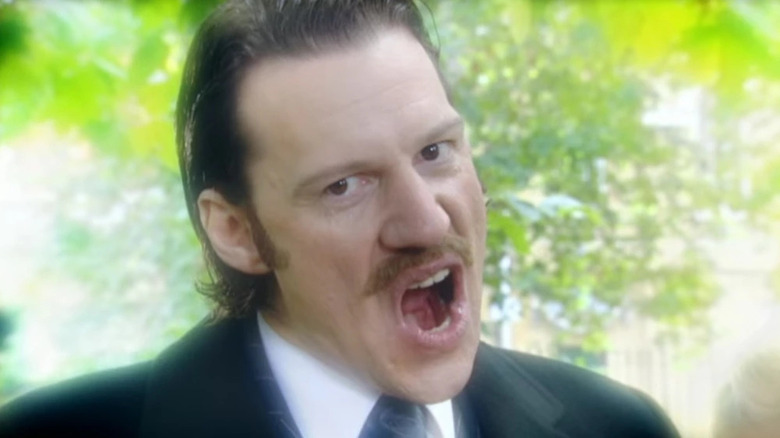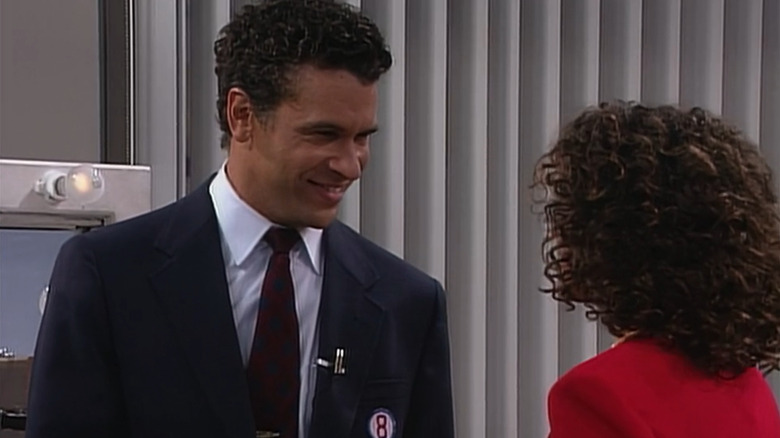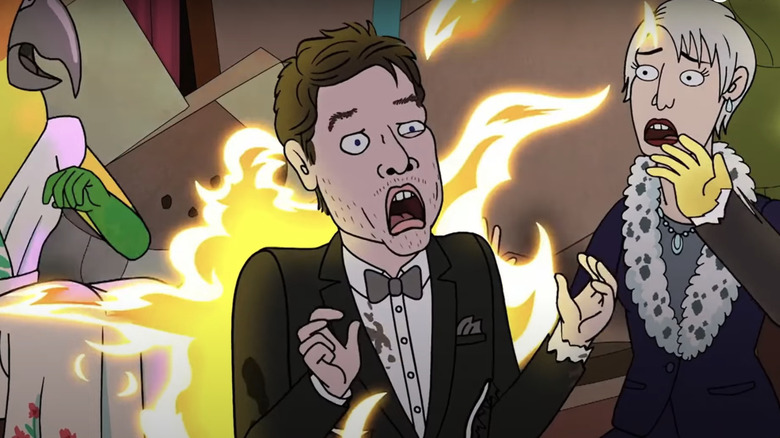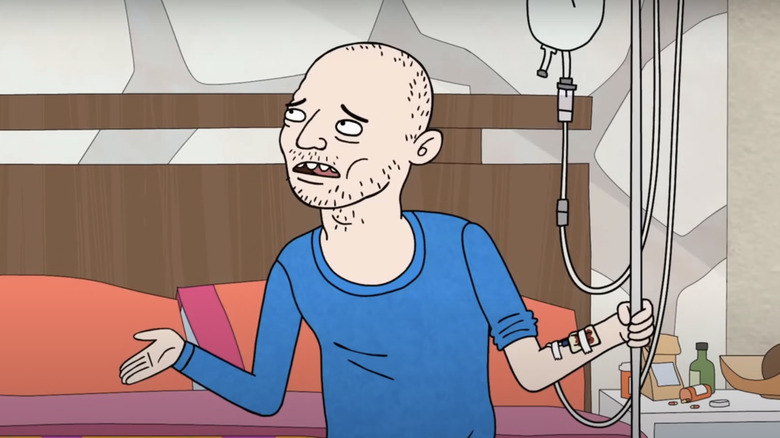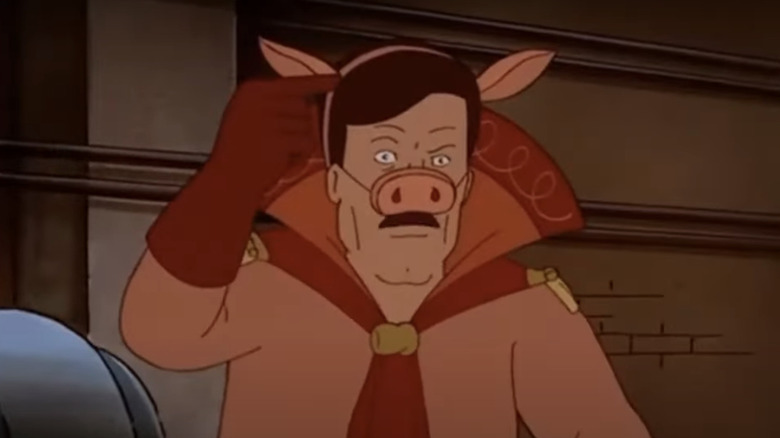The Most Bizarre Sitcom Deaths Explained
Sitcoms have been a beloved entertainment staple in American culture for decades. Audiences love watching sitcoms for their reliability in providing a digestible break from reality with their relatable humor every week, while television networks favor them due to their widespread popularity, large profitability, and relatively low production costs.
For those reasons, sitcoms typically play it safe with the stories they tell, often resorting to sanitized, formulaic tropes and doing everything in their power to avoid dramatic risks that could jeopardize their comedic appeal. One such risk is having characters die, because, let's be fair, death can be an absolute bummer, especially for viewers looking to unwind with a quick laugh after a busy day. However, the unpredictability of real life can catch up to the predictability of sitcoms through behind-the-scenes occurrences. Cast members sometimes exit a show or pass away, forcing showrunners to write their characters off.
Most of the time, these character exits are handled discreetly, like having them move to another city or killing them off-screen in a non-gratuitous and family-friendly manner. But there are times when characters are killed off in the most unconventional manner, adding a creatively comic touch to the tragedy of death. They may be unpredictable, gratuitous, unimaginable, or tonally opposed to the conventional lightheartedness of the genre — and they often provoke strong reactions from audiences, favorable or otherwise. Here are some of the most bizarre sitcom deaths, explained.
Susan Ross - Seinfeld
The seventh season of "Seinfeld" follows George (Jason Alexander) as he faces the consequences of his impulsive proposal to his girlfriend Susan (Heidi Swedberg), out of a misguided pact he made with Jerry (Jerry Seinfeld) to get married concurrently. While Jerry has the better sense to drop the pact, it's too late for George, who immediately regrets his hasty decision. Naturally, George — who works harder at avoiding confrontations than anything — tries every scheme he can to have Susan break their engagement rather than simply tell her he isn't ready for marriage.
However, things end up working out for George, as Susan unexpectedly passes away in the Season 7 finale, "The Invitations." She dies while licking the envelope seals of their wedding invitations, later revealed to be fatal due to the toxicity of the low-quality glue in the cheap envelopes (which were conveniently picked out by the ever-penny-pinching George himself).
Aside from the sudden and unprecedented death of such a significant character, what's more shocking is George's reaction to the news. He instantly skips over the first four stages of grief (denial, anger, bargaining, depression) and hops straight over to acceptance with a poorly veiled sense of relief. George holds absolutely no guilt over his actions, which indirectly lead to his fiancé's death, making it one of the most terrible things George ever did. Meanwhile, the gang's visible indifference to the news does nothing but highlight their sociopathic tendencies and callous nature.
Maude Flanders - The Simpsons
The abrupt death of Maude Flanders (Maggie Roswell) in the Season 11 episode "Alone Again, Natura-Diddily" of "The Simpsons" was shocking enough for a cartoon, even if the events leading up to her demise were a darkly humorous result of none other than Homer Simpson's immature antics. In the episode, while watching a NASCAR race at the Springfield Speedway, a shirtless Homer (Dan Castellaneta) attracts the attention of cheerleaders armed with T-shirt cannons, only to be distracted by a bobby pin on the floor. He bends down, leading to the T-shirt projectiles hitting Maude behind him and pushing her off the grandstand to her death.
The scene itself is oddly funny for a few reasons. Of all the countless other things that Homer could have been characteristically distracted by (like a donut or a can of Duff beer), it's a random bobby pin that becomes the catalyst for tragedy here. Not to mention that it takes Ned (Harry Shearer) three long seconds to react after Maude gets knocked off the railing and screams as she falls down, until he hears a "thud" below.
However, the comedic effect of the scene may wither away when you consider that Maude was actually killed off for a rather cynical real-life reason. The character's voice actor, Roswell (who, in addition to voicing Maude, had also voiced several other characters on the show), asked for a modest raise in pay from Fox to cover her travel costs from Denver to L.A. (which she had been funding herself for several years). After Fox's refusal, Roswell departed the show, leading her character to be written off in a manner that many to this date consider to be a moment in "The Simpsons" that went too far.
Frank Grimes - The Simpsons
The absurdity of the world of "The Simpsons" and its characters may be entertaining to watch from the safe distance of a television screen. However, would a real person placed inside the show's world be able to endure all its insanity-inducing idiocy? This idea formed the basic premise for the Season 8 episode "Homer's Enemy," as voice actor Hank Azaria told the Television Academy Foundation, "What if a real person had to deal with Homer Simpson?" Sadly enough, this encounter proved fatal for Frank Grimes (Azaria), the episode's titular one-off character who is introduced as Homer's new (and more hard-working) co-worker.
Being the only one to see Homer for the juvenile halfwit he truly is, Frank spends the entire episode trying to highlight the extent of Homer's stupidity to their peers at the power plant. However, each attempt backfires, and after Mr. Burns (Harry Shearer) favors Homer's idea over many other, more sensible ones, Frank snaps into a spiral of insanity that leads him to emulate Homer's tomfoolery around the plant. Each act becomes more intense, ultimately culminating in a (literally) shocking end as Frank grabs hold of high-voltage wires without protective gloves, which electrocutes him.
The episode makes a jarring tonal turn as the scene immediately cuts to his gravestone, confirming his death. Sure, Frank may have come across as a bitter character, but hardly anyone deserves to have their sanity beaten in a world where ignorance prevails over rationality. It's an ending so bleak, especially for a cartoon, that it led some viewers to contemplate whether Frank Grimes actually had a point.
Maureen Ponderosa - It's Always Sunny in Philadelphia
The mysterious death of Maureen Ponderosa (Catherine Reitman), the estranged wife of Dennis Reynolds (Glenn Howerton), was the center of the Season 12 episode "Making Dennis Reynolds a Murderer" from "It's Always Sunny in Philadelphia." As you guessed from its title, the episode parodied the sensationalist nature of true crime documentaries like Netflix's "Making a Murderer."
The episode begins with the discovery of a deceased woman dressed as a cat in an alleyway, soon revealed to be Maureen — a pay-off of the show's recurring gag where the character began to increasingly identify as a cat through each season. After getting multiple plastic surgeries to look more like a cat, Maureen had fully transitioned into her feline alter ego named "Bastet" (after the Egyptian cat goddess) and engaged in outlandish cat-like antics (like using a litter box).
In the end, after the faux documentary intentionally tries to frame Dennis as a prime suspect, Dennis casually reveals that the case was open and shut after video evidence showed Maureen "prancing around on the rooftops like an ***hole," implying that she fell to her death. Considering that we have already seen Maureen prancing around in a courtroom in a cat costume, the throwaway explanation for her death seems hilariously plausible given the trajectory her character arc was headed toward, and it fits all too well with the show's hideously uncomfortable black humor.
Pierce Hawthorne - Community
Pierce Hawthorne (Chevy Chase), the only elderly member of the study group in "Community," was infamous for being the politically incorrect goofball who made racially insensitive and sexist remarks to everyone around him. It may be amusing to watch such a character's antics unfold on the TV screen, but not so much when it mirrors the actor's bad behavior on set. Such was the case with Chase, whose tumultuous history on the show's set included frequent clashes with creator Dan Harmon, conflicts with his co-stars, and uttering racial slurs in the presence of his Black co-stars Donald Glover and Yvette Nicole Brown. One such incident led to Chase's departure from the sitcom mid-way through production on its fourth season, after which his character met an off-screen death in the subsequent season.
The Season 5 episode "Cooperative Polygraphy" centers on resolving Pierce's arc. After his funeral, Pierce's executor, Mr. Stone (Walter Goggins) distributes Pierce's last words, individualized gifts, and a canister containing Pierce's frozen sperm to each member of the study group. His death remains a mystery until the episode's ending, when Mr. Stone drunkenly reveals to the gang that Pierce had died from dehydration after filling up the canisters.
First off, no, excessively pleasuring yourself won't kill you, as some folks would have you believe, nor does it pose any major health risks. Well, unless you're a 70-year-old trying to consecutively produce enough sperm to fill six whole canisters. If that puts an unflattering image in your head, then Pierce Hawthorne has truly lived up to his perverse legacy, even in death.
Charlie Harper - Two and a Half Men
Charlie Harper (Charlie Sheen) has the rare honor of being a sitcom protagonist who's killed off twice on their show — an honor that's bestowed by Sheen's firing from "Two and a Half Men" as a result of his oft-reported personal controversies and disparaging remarks on creator Chuck Lorre and CBS. After being written off in an off-screen death in the Season 9 premiere, Charlie's initial death is retconned in the series finale "Of Course He's Dead," as he's revealed to have been alive the whole time and now filled with homicidal vengeance against the show's leads. An absent threat for most of the episode, Charlie reappears (obviously played by an extra and not Sheen), only to be crushed to death by a helicopter dropping a piano onto him.
As if having fans' hopes of seeing Charlie once again quashed so violently wasn't jarring enough, the show immediately breaks the fourth wall by revealing the entire set, with Lorre seated in the director's chair, looking at the camera and saying "winning," before a piano falls onto him too.
While "Two and a Half Men" may have increasingly gotten too ludicrous with its plot to the point of being inexplicably nonsensical long before its finale rolled around, everything about the ending left even long-time viewers scrambling for an explanation. After all, Charlie's re-death and Lorre's cameo served barely any purpose to the narrative and were more focused on delivering tongue-in-cheek meta references about Sheen's scandals and the real-life public feud between Lorre and Sheen.
Deangelo Vickers - The Office
It's safe to say that fans of "The Office" were underwhelmed by Deangelo Vickers (Will Ferrell) as the new Dunder Mifflin Scranton manager replacing Michael Scott (Steve Carell), a character who became so cherished by television audiences that his departure in Season 7 was widely viewed as the beginning of the show's downfall. Fortunately for those who couldn't stand the character, Deangelo was only intended for a four-episode arc and was written off in the Season 7 episode "The Inner Circle," which immediately followed Michael's departure.
After taking up Jim's (John Krasinski) challenge to do a free-throw line dunk at the warehouse, Deangelo falls down with the hoop crashing into him. He's sent to the hospital, but reappears in the office one last time at the end of the episode in his hospital robes, telling a joke in gibberish that indicates he's severely brain damaged. A few episodes later in Season 8, it's confirmed that Deangelo was declared brain-dead.
Though Deangelo was an unpopular character, the dark nature of his demise was difficult to laugh at, considering the generally upbeat tone that had been established in the show so far. It was bizarre enough to see a character we were warming up to suddenly walk into the office in a hospital gown and appear to have lost all his cognitive functions, only to be followed by an offhanded revelation of his off-screen fate.
Lucille 2 - Arrested Development
Regarded to be one of the worst things about Netflix's seasons of "Arrested Development," Season 5 revolved primarily around the disappearance of Lucille Austero (Liza Minnelli), the ditzy neighbor and frenemy of the Bluth family matriarch, Lucille Bluth (Jessica Walter). After a series of events that saw each Bluth family member being either accused or arrested in relation to Lucille 2's disappearance, the season seemingly forewent any concrete resolution to this mystery, until the concluding "on the next Arrested Development" segment of the series finale, "The Fallout."
When everyone smashes down a wall with a visible mannequin, used earlier in Buster's (Tony Hale) and Gob's (Will Arnett) supposed magic trick, the mannequin turns out to be the corpse of Lucille 2, with a mask concealing her face. Backed into a corner, Buster admits he "did it," before creepily remarking how much her corpse looks like his mother, Lucille.
Not only did this scene disappoint fans as an anti-climactic ending to a series that spanned 16 years across five seasons, but it also left them unsettled by the offhanded revelation of Buster's dark side. It marked Buster's bizarre Flanderization from being an obsessive-yet-harmless momma's boy to becoming an Oedipal psychotic murderer. What adds to the disconcerting nature of Lucille 2's death is her brief dating history with Buster — a relationship with a disturbing mother-son dynamic influenced by Buster's dysfunctional relationship with his own mother and Lucille 2's namesake. Not only did Buster murder Lucille 2, but he also hid her rotting corpse by cementing it into a wall. And he used it in a public magic act!
Chef - South Park
Viewers grew fond of Chef for being one of the few adults in "South Park" who had a cordial relationship with the boys, which was why many considered his death in the Season 10 premiere "The Return of Chef" to be a stain on his legacy. The episode sees Chef falling to an excessively graphic death and getting impaled, burned, pummeled, and shot. If that wasn't enough, a bear and a lion rip his face and his body to shreds, leaving his bones and guts exposed before postmortem defecation confirms his death. While "South Park" doesn't shy away from gratuitous obscenities for their own sake, Chef's death shocked audiences because, aside from having to see any character experiencing physical obliteration of this level, Chef was probably the last person on the show who deserved such a fate.
The behind-the-scenes drama that resulted in Chef being written off may add some context to the character's humiliating fatal treatment. After the show satirized the controversial religion of Scientology in the Season 9 episode "Trapped in the Closet," Isaac Hayes, Chef's voice actor and a Scientologist himself, publicly denounced the show and resigned, which caused friction between the actor and "South Park" creators, Matt Stone and Trey Parker.
Though Hayes' son alleged several years later that the Church had "quit South Park on Isaac Hayes' behalf," it was all too late to prevent the controversy from spilling into Chef's storyline, where he was brainwashed by the Super Adventure Club, a thinly veiled allusion to Scientology. The character's gruesome death served as a peculiar form of "punishment" in the narrative that mirrored the real-life tension between Hayes and his religion and the show's creators.
Denholm Reynholm - The IT Crowd
As the proud founder of Reynholm Industries, which is the workplace of the protagonists of "The IT Crowd," Denholm Reynholm (Chris Morris) may just be the epitome of corporate hubris. In the Season 2 episode "Return of the Golden Child," the character boasts to his board members about his many accomplishments in all its glorious exaggeration (such as starting Reynholm Industries with just "a dream ... and 6 million pounds") and exhibits no shame in declaring that he may just be "the greatest man in the world."
However, this bravado quickly falls off when his assistant tells him that the police have come to inquire about an irregularity in the company's pension fund. He initially seems calm and collected, even politely asking the assistant to prepare tea for the policemen, until he nonchalantly walks over to the window pane, opens it, and leaps out.
Aside from the absolute lack of hesitation in the way Denholm decides to end his life, what's more amusingly bizarre is the way that the entire scene is staged like a theatrical production where the character literally "steps out" of the show, albeit to his own death. Couple that with the build-up, which made it seem as though nothing could ever bring Denholm down, and you have the perfect dramatic exit for the character.
Trevor Collins-Newsworthy - The Fresh Prince of Bel-Air
Just when it seemed as though Hilary Banks (Karyn Parsons) found her perfect match with the equally self-assured Trevor (Brian Stokes Mitchell), tragedy struck as their growing relationship ended on a tragic note in the Season 4 episode, "Where There's a Will, There's a Way."
After convincing Trevor to propose to her in an extravagant way, Hilary, excited and clad in a wedding gown, sits with her family to watch Trevor perform a televised bungee jump while announcing his proposal to Hilary publicly. He jumps as we hear him yelling, "HILLARY BANNKSS... WILLL YOUU MARRRYYY MEEE–-," followed by a loud and unmistakable SPLAT that ends his grand gesture horrifically.
The Banks family and live audience immediately understand what's happened, but funnily enough, Hilary, not knowing what a bungee jump is, still needs to be clued in by Will (Will Smith) that a bungee jump isn't supposed to end with a person falling down and hitting the ground. Her father, Philip (James Avery), expresses hope that "Trevor's okay," only for the episode to immediately transition to Trevor's funeral — a darkly comic twist that was a rarity for the show's generally sanguine tone. Given the way things were going well in their relationship — to the extent that they were ready for marriage — anyone would expect the proposal to lead to a heart-warming wedding season arc for Hilary, which made Trevor's sudden death all the more unexpected and awkward.
Zach Braff - BoJack Horseman
One of the most memorable aspects of "BoJack Horseman" is its celebrity cameos. Sometimes, those celebrities are voiced by their real-life counterparts, and it's fun to see the show poke fun at these individuals and the general celebrity culture of Hollywood. Actor and director Zach Braff voiced an exaggerated version of himself in the Season 4 episode "Underground," which sees Zach and other Hollywood celebrity guests (including Jessica Biel, also voiced by herself) getting trapped underground in Mr. Peanutbutter's (Paul F. Tompkins) sunken house.
After having spent days underground with a shrinking food and air supply, the guests become increasingly deranged and try to cannibalize Mr. Peanutbutter, only to be stopped by Zach, who goes on a tangent of delivering an insightful and heartfelt monologue (parodying the actor's episode-ending monologues on "Scrubs"). But he's stopped short by Jessica Biel, who sets Zach ablaze and declares "the fire" as law. It's revealed later that Jessica and the other guests had feasted upon Zach's burnt flesh.
You don't see a real-life personality being killed off on-screen every day, especially in such a fiery and agonizing fashion as Zach screams for help until succumbing to the fire. What heightens the absurdity is the realization that the real-life Zach Braff had to agree to voice a satirical version of himself in an episode that ultimately sees him immolated and cannibalized by Jessica Biel. It's strangely wholesome to see these actors embracing the show's caricatures of them and taking part in every self-deprecating joke thrown their way.
Herb Kazzaz - BoJack Horseman
Among the many other aspects of "BoJack Horseman" that were utterly heart-wrenching, the titular character's (Will Arnett) failed attempt at reconciliation with his former best friend Herb Kazzaz (Stanley Tucci) before the latter's death was one such aspect. However, the comedic manner of his off-screen death may just cushion the blow.
Herb's terminal cancer diagnosis is established for most of the show's first season, only for the character to be killed off-screen in Season 2. However, it isn't cancer that kills him as the show set us up to believe — rather, as Henry Winkler (voiced by the "Happy Days" actor himself) reveals during his eulogy for Herb in the episode "Still Broken," Herb's cancer went into remission, but he ended up in a car accident after excitedly tweeting about his cancer recovery while driving. The car accident wasn't fatal by itself, but because Herb crashed into a truck transporting peanuts, something Herb was seriously allergic to.
It's also revealed that Herb kept sending out tweets through the entire ordeal, with all the appropriate hashtags like "#tweetingwhiledriving," "#hopefullyitsnotfullofpeanuts," and "#ohnoitwasfullofpeanuts." To top that, Winkler reads all of Herb's last tweets like a storybook, simulating the mix of emotions that Herb went through in his final moments. It's the unexpected piling on of each factor leading to Herb's death that adds the "comedy" to the tragicomedy. Just when you think you finally know how Herb died, there's another twist to it that subverts it, until it reaches a point where the humor completely overtakes the tragedy.
Trip Larsen - King of the Hill
It's no surprise that what's regarded to be one of the darkest episodes of "King of the Hill" would have a character death equally as dark and a lot more bizarre.
In the Season 7 Episode "Pigmalion," Trip Larsen (Michael Keaton) is Luanne's (Brittany Murphy) new boss at the meat factory, who is later revealed to be a groomer with schizophrenia and a pig-based clinical lycanthropy (meaning that he believes he can turn into a pig). Clad in a swine costume, a psychotic Trip chases Luanne through the factory in a horror haunted-house sequence and ends up on a conveyor belt headed toward the meat-grinding machine — hysterically laughing and accepting his fate. That is, until a shock in the head snaps Trip out of his state of psychosis, as he remarks he's "suddenly able to think clearly." However, this sanity comes too late for him, as he is immediately gruesomely killed on the conveyor belt.
Despite the episode's unusually eerie tone, not everyone expected such a bleak ending. In a discussion in the "King of the Hill" subreddit, u/PancakeParty98 commented, "This one really ****ing threw me. My gf and I watch KOTH when we need uplifting content, and I kept waiting for a happy ending. All of it was horrifying." Similarly, in the same Reddit conversation, u/ArchedDeer432 said, "As someone who suffers from a mental illness – I couldn't imagine feeling 'fine' and 'okay', all the bull**** cleared from your mind/eyes. Then only to die, ya...pretty ****ing sad."
Jason Mendoza - The Good Place
Before the events of the pilot episode of "The Good Place," all four protagonists die insanely wacky deaths in the real world that thematically tie into the reasons they end up in the Bad Place (the show's version of Hell). However, Jason Mendoza's (Manny Jacinto) death takes the cake of being the most bonkers out of all of them. Not only is it totally unpredictable and bizarre, but it's also representative of the character's innocence and slow-wittedness.
In the Season 1 episode "What's My Motivation," a flashback sequence reveals how each of the four protagonists met their ends, including Jason. It turns out that Jason hatched a scheme with his equally dim-witted friend Pillboi (Eugene Cordero) to rob a Mexican fast-food restaurant (among all the places they could pull a caper). According to the plan, Jason would hide in a large safe and Pillboi would install the safe in the restaurant, where Jason would come out, steal the restaurant's money, and get back inside the safe again for Pillboi to get him out.
However, in his attempt to mimic the robbery in the iconic heist movie "Ocean's Eleven" (where a character infiltrates a casino vault by hiding in a trolley), poor Jason, far from being the smartest character on the show, fails to consider the lack of oxygen inside the safe. A police officer later tells an arrested Pillboi that Jason was found dead inside the safe after doing a bunch of whippets. His death becomes much more grotesque when one imagines how horrific and painful his death must have been as a result of the suffocation — a cruel ending for the puppyish Jason.
